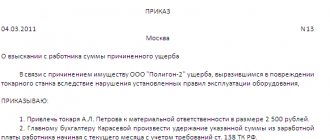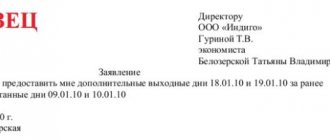- Is it lawful to dismiss someone on the basis of a certificate confirming that the employee is disabled?
- What documents will confirm the absence of suitable work in the company?
- How to record an employee’s refusal to be transferred to another position
Polyak Maria Ivanovna , lawyer, Deputy Chairman of the Presidium of the Bar Association “Gribakov, Polyak and Partners” Labor lawyer for organizations Our services
Our lawyers will help in resolving issues related to the termination of contracts with employees! The practice of the Bar Association “Gribakov, Polyak and Partners” in Moscow has a large number of successful cases. Contact us.
Many companies are not interested in continuing a relationship with an employee who, for medical reasons, needs special working conditions. In this regard, employers often look for ways to terminate an employment contract with such an employee precisely on the basis of the medical certificate issued to him. However, it is important to remember that such dismissal may be lawful if a number of important conditions are met.
First of all, the employee must have a medical report on hand indicating the presence of contraindications regarding the work performed, as provided for in the employment contract. Moreover, these contraindications should completely exclude the possibility of the employee continuing to work in the company. Note that dismissal itself can only occur if the employee refuses to be transferred to another job. Moreover, if the employer believes that there are simply no suitable vacancies in the company, he needs to have evidence that working conditions in other positions also do not exclude the impact on the employee of those factors due to which work is contraindicated for him. However, as practice shows, this can be very difficult to do.
Management Responsibility
The law now contains an obligation for managers to conduct medical examinations of their employees. At the same time, the organization itself must pay for such procedures. This rule applies to all examinations.
For the period while the employee is unable to perform his duties due to undergoing a medical examination by doctors, his place of work is retained and payment is made from his average earnings.
A preliminary medical examination is necessary for people who are just getting a job. Periodic examinations must be carried out by citizens for whose workplaces this is required by the conducted SOUT, or by the standards of current legislation.
An extraordinary examination can be carried out in a situation where, due to the current state of health, the worker cannot cope with his duties. The indications for this medical examination are also determined by law.
The technical specifications establish an obligation for an employee to undergo a medical examination in certain situations.
ATTENTION! If a manager ignores the requirements of the law and does not conduct medical examinations for his subordinates, he may be held administratively liable.
Permission to perform official duties
If, within the prescribed period, the employee who was at fault still undergoes a medical examination, he will be reinstated at work. The basis is Article 76, Part 2 of the Labor Code of the Russian Federation. Passing a medical examination must be confirmed by a document - a conclusion on the state of health. It is issued by a medical institution (clause 31 of the Procedure for conducting medical examinations).
Permission to perform official duties is issued by a separate order. This is necessary because this document will be able to record the end of the period of suspension. The paper is drawn up in any form, but at the same time it must indicate the following information:
- Information about the employee: Full name, position.
- The date from which the subordinate must begin performing his duties.
- Reason for previous suspension from work.
- An order addressed to the accounting department with the requirement to resume calculating wages to the employee.
- Details of the medical document.
- Signatures of the parties: the head of the enterprise and the subordinate.
It is better not to hold out until the moment when the employer is simply forced to suspend cooperation, or even stop it altogether. After all, no matter how loyal management is to its subordinates, not a single manager will pay large fines for careless personnel. Therefore, you should not test the employer’s patience. It would be much wiser to comply in a timely manner with the legal requirement for mandatory medical examination.
Who should be examined
List of persons for whom medical examinations are a mandatory procedure:
- If the employee is under 18 years of age;
- If, based on the results of the special operational assessment, it is revealed that the employee’s place of work is exposed to aggressive and dangerous factors;
- Workers who handle food products and are involved in sales;
- People who work on shifts;
- Workers who perform their labor functions underground;
- Employees who perform duties in the Far North;
- Non-departmental security workers;
- Professional level athletes;
- Citizens working in the field of education;
- Workers who manage transport.
Who is required to undergo a medical examination
Russian legislation establishes a list of people who must undergo regular medical examinations.
These include the following citizens:
- minor employees of any enterprise;
- people who are exposed to hazardous or harmful factors at work;
- citizens working in the food sector, as well as selling food products;
- people involved in organizing catering;
- specialists working on a rotational basis;
- people working underground;
- workers of the Far North or other similar regions of the country;
- representatives of private security;
- professional athletes;
- employees of educational organizations;
- public transport drivers.
How to pass a medical examination at work? Watch the video:
According to regional standards, the number of employees who must undergo a medical examination may increase. A medical examination is a combination of several procedures that help identify various occupational diseases in a citizen.
Who must pay tax on winnings? Find out here.
It is carried out only in medical institutions. Each profession has its own deadlines and rules for undergoing a medical examination. Therefore, it can be preliminary and periodic, as well as extraordinary.
If a person does not undergo a medical examination because he is absent from the selected medical institution on time, then this is grounds for his removal from work.
Timing and frequency
A medical examination is a set of procedures aimed at identifying an employee’s occupational diseases and preventing the risk of their progression. It is performed in special institutions.
For each profession, the duration and frequency of medical examination are set. The following types can be distinguished:
- Preliminary examination is carried out in relation to certain categories of workers at the time of their entry into the workplace.
- Pre-trip and post-trip - necessary for transport employees due to the fact that not only their lives, but also the health of surrounding citizens depend on the condition. Performed before they go to work and after it. That's why they are carried out every day.
- Extraordinary - carried out on the initiative of an employee or management.
- Periodic inspection - carried out after a certain period of time in accordance with SOUT, standards, etc. For each profession, the frequency of sending an employee for a medical examination is set. In this case, the frequency of examination can be set by law from 1 to 4 times a year.
For example, catering staff must undergo a medical examination once a year, workers who have to work underground - once a year, staff caring for the elderly and children - 4 times a year, etc. Factors related to the place of work also influence; for them, the frequency is set by the SOUT.
ATTENTION! The frequency of the examination determines the period when the employee must be sent for a medical examination.
Legal requirements
The Labor Code of the Russian Federation, namely Article 212, states that the responsibility for conducting a medical examination of workers lies with the employer. That is, the medical examination must be carried out exclusively at the expense of the employing company. The same document (Article 213 and 348.3) also mentions those professions for whose representatives periodic examination is mandatory. This group includes:
- Persons working in hazardous and hazardous industries. The list of hazardous work, as well as types of activities harmful to health, is established by the Order of the Ministry of Health and Social Development.
- Employees of food enterprises.
- Medical workers.
- Employees of educational institutions.
- Drivers.
- People working in industries related to machinery.
- Other specialties included in the list established by law.
If an employee fails to comply with this requirement, the employee who has not undergone a periodic medical examination, of course, does not face dismissal. But this will give the employer a reason to record a disciplinary violation. And it can already lead to the cancellation of the employment contract.
In addition, there are legislative provisions on passing a medical examination for persons who are just applying for a job. Issuing referrals for examination is the responsibility of the employer. It is mandatory to undergo a medical examination:
- Minor applicants (under 18 years of age).
- Persons seeking employment in the regions of the Far North (Article 324 of the Labor Code of the Russian Federation).
- Shift workers (Article 298 of the Labor Code of the Russian Federation).
- Athletes.
- Workers whose activities will be related to driving vehicles (air, water or land).
- Persons engaged in underground work (Article 330.3 of the Labor Code of the Russian Federation).
- To the security guards.
- Employees who spend more than half of their working time at a computer monitor (clause 13.3 of SANPIN 2.2.2/2.4.1340−03).
Medical opinions can be issued only by those medical institutions and organizations that have a license to carry out this activity.
Employee refusal
The main step is to document the occurrence of a violation, which allows the citizen to be removed from work. This can be done if one of the following documents is generated:
- Explanatory note from the employee stating that he did not undergo a medical examination;
- Refusal to be examined in writing;
- A sick leave certificate issued during the medical examination;
- An act that an employee evades examination;
- Memorandum from employers or other officials;
- Other papers that will confirm the fact of violation of the agreement and the missed medical examination.
Drawing up an order
Based on the completed papers, an order on suspension from work is created. The law does not establish a specific form for this document, so you can write freely.
As a basis for issuing an order, you will have to indicate information about a document that confirms the fact of refusal to undergo or not to undergo a mandatory examination. The order must record the reason for removal from activity, as well as the period. You can write the standard “until the circumstances that became the basis for removal are eliminated.”
IMPORTANT! Another point that should be shown in the order is the payment procedure for the entire period of suspension. Usually, during this time, the employee’s salary is not transferred, except in cases in which the employee was unable to undergo the examination for a good reason.
Employee notification
To confirm that the employee is aware of the reasons why he is not allowed to work, he must be given a written notice. This documentation is usually prepared on official letterhead in free form.
It must indicate:
- Personal data and position of the employee;
- Information that he must undergo periodic medical examination;
- Information about from what day he will be removed from duties if he misses the examination;
- Data regarding enlistment or deprivation of wages during the period of suspension.
At the bottom of the form there must be a field in which the employee must sign.
ATTENTION! If a subordinate refuses to sign, you need to assemble a commission that will draw up and sign an act of refusal.
What should an employee do?
The actions performed by a specialist depend on the situation in which he finds himself. If he simply did not come for the examination, then it is advisable to undergo this check. If a person receives a negative conclusion, then he will have to change his place of employment.
Employee refuses to undergo medical examination
Employees of any company are warned in advance by employers about the need to undergo a medical examination, and therefore receive written notice. If a person does not come to the medical organization on the appointed day, then management draws up a report of failure to appear.
The employee can then prepare evidence of a valid reason for skipping this check. As soon as possible, you must undergo a medical examination for work.
If a person does not have compelling reasons for such behavior, then he may be subject to disciplinary action, which includes dismissal. Until the inspection is completed, the person will not be able to begin his/her official duties.
Determination of professional incompetence
If a person has undergone an examination, but as a result, serious health problems have been identified, then he is faced with the loss of his main place of employment. He can draw up a statement on the basis of which the employer can offer another job in the company.
The transfer can be permanent or temporary, and in the second case the duration of the work cannot exceed 4 months. If a person refuses a transfer or there are no vacancies in the company, then the citizen is dismissed unilaterally.
Passing a medical examination. Photo fb.ru
A person can count on compensation payments and severance pay. If, based on the results of the examination, a person receives a disability, then he will not be able to continue working, but he can apply for benefits.
If a company employee does not pass a medical examination for any reason, he is suspended from work. If he is found unfit for work, he is transferred to a new place or dismissed. The head of the company must know what documents should be drawn up in each situation in order to avoid problems with the labor inspectorate.
Don't forget to add "FBM.ru" to your news sources
Grounds for dismissal
The company's management may suspend an employee from work if he has not passed a medical examination.
When he refuses a medical examination in the future, then it is possible to formalize the termination of the business contract on the basis of
clause 5 of Part 1 of Art. 81 of the Labor Code of Russia , which implies similar punishment for repeated failure by this citizen to fulfill his work duties.
But, when the commission recognizes an employee as unsuitable for this work, and the boss does not have the opportunity to transfer him to simplified work, then the organization can also terminate the TD on the basis of clause 8, part 1 of Art. 77 of the Labor Code of Russia , which presupposes dismissal for refusal to transfer to another job based on doctors’ testimony.
A medical report may establish a disability for an employee, due to which he will not be able to work at all in the future. Termination of the agreement with him occurs at the initiative of the manager on the basis of clause 5, part 1, art. 83 of the Labor Code of Russia, which allows you to dismiss an employee due to inability to work for health reasons.
If the employee has not passed the medical examination
In the organization, employees undergo medical examinations. Based on the results of the next examination, the clinic sent the employer a conclusion that the employee was unfit and could not work in this position. The employer does not have any vacant positions for which the employee could perform work taking into account existing contraindications. What sequential actions must the employer take? How to make a record in the workbook?
An employer who has received a medical certificate that an employee is unfit for work in his position (employees, that is, specialists or managers) or profession (workers), should take the following actions.
1. According to paragraph 5, part 1, art. 76 of the Labor Code of the Russian Federation, the employer is obliged to remove from work (not allow to work) an employee if, in accordance with a medical report issued in the manner established by federal laws and other regulatory legal acts of the Russian Federation, contraindications for the employee to perform work stipulated by the employment contract are identified. Thus, the first step is issuing an order to remove the employee from work.
The order is drawn up in any form and signed by the head of the organization. The employee should be familiarized with the contents of the order against signature. During the period of suspension from work, the employee is not paid wages.
From the norms of Art. 76 of the Labor Code of the Russian Federation it follows that suspension from work in this case does not depend on the will of the employer, but on the presence of medical contraindications established by the medical institution (Decision of the Moscow City Court dated 03/02/2011 in case No. 33-5685, Appeal determination of the Moscow Regional Court dated 21/07 2014 in case No. 33-15624/2014).
2. The employer is obliged to notify the employee about the absence of vacancies at all or vacancies that are not contraindicated for the employee for health reasons.
The notification is drawn up in any form, signed by the head of the organization and handed to the employee against signature (Article 73 of the Labor Code of the Russian Federation) (Appeal ruling of the Lipetsk Regional Court dated September 10, 2014 in case No. 33-2401/2014).
3. At the same time, it is necessary to check the period for which the employee is declared unfit for work .
If the period is less than four months, then the suspension is issued before the expiration of the period specified in the conclusion (since, as follows from the question, the employer does not have vacancies for transferring the employee to another position (paragraph 2 of Article 73 of the Labor Code of the Russian Federation)). After the specified period, the employer issues an order to allow the employee to work, and the employee continues to work in his position/profession.
If the period for which the employee is declared unable to perform his work is more than four months or is not indicated in the medical report, and the employer does not have vacancies for such an employee, then the employee must be dismissed in accordance with clause 8 of part 1 of article 77 of the Labor Code of the Russian Federation following the appropriate procedure. In this regard, a dismissal order is issued, indicating as the basis for its issuance a medical report and a certificate of the absence of vacancies suitable for the employee, taking into account his competencies and health status.
The order can be issued in the unified form No. T-8 or in another form determined by the employer. The employee’s dismissal order must be submitted against signature. If the order cannot be brought to the attention of the employee or the employee refuses to familiarize himself with it under signature, a corresponding entry is made on the order.
4. It is necessary to make an entry in the employee’s work book (example).
Example

5. Make a record of the employee’s dismissal in accordance with the wording in the work book in the employee’s personal card (Form No. T-2 or the form used in this personnel service). The entry in the work book should also be familiarized to the employee against a signature in the personal card (clause 41 of the Decree of the Government of the Russian Federation of April 16, 2003 No. 225 “On work books” (as amended on March 25, 2013)).
6. On the last day of work, issue the employee a work book . In this case, the employee must sign in the book recording the movement of work books and inserts in them.
7. Dismissal under clause 8, part 1, art. 77 of the Labor Code of the Russian Federation provides the employee with additional guarantees . So, in accordance with paragraph 5 of Part 2 of Art. 137 of the Labor Code of the Russian Federation cannot be withheld from an employee vacation pay for unworked vacation days, and the employee is also paid severance pay in the amount of 2 weeks of average earnings (Part 3 of Article 178 of the Labor Code of the Russian Federation).
Thus, on the day of dismissal, the employee must not only be paid all wages due to him and compensation for unused vacation, but also severance pay in the amount of 2 weeks' earnings.
An employment contract with the heads of organizations (branches, representative offices or other separate structural units), their deputies and chief accountants who, in accordance with a medical report, need a temporary or permanent transfer to another job, if the transfer is refused or the employer does not have the corresponding job, is also terminated in accordance with clause 8, part 1, art. 77 Labor Code of the Russian Federation. However, the employer has the right, with the written consent of these categories of employees, not to terminate their employment contract, but to suspend them from work for a period determined by agreement of the parties. During the period of suspension from work, wages are not accrued to these employees, unless this is provided for in a collective or labor agreement.
Unsuitability
If it is determined that a worker cannot perform a certain job according to doctors' testimony, he can immediately write a petition requesting his transfer to another place that is more suitable for him. If it exists, the Labor Code manager is obliged to transfer the employee.
The transfer can be temporary (up to four months) or permanent. If the worker does not consent to the transfer, then with a temporary type, the administration suspends him from activity for a certain period; with a permanent transfer, dismissal is carried out. Upon dismissal, the worker receives compensation.
ATTENTION! Thus, if a subordinate has not passed the examination and is not fit for further activities in his place, then he can either agree to the transfer or leave under the article and look for another workplace where this pathology will not be considered an obstacle.







